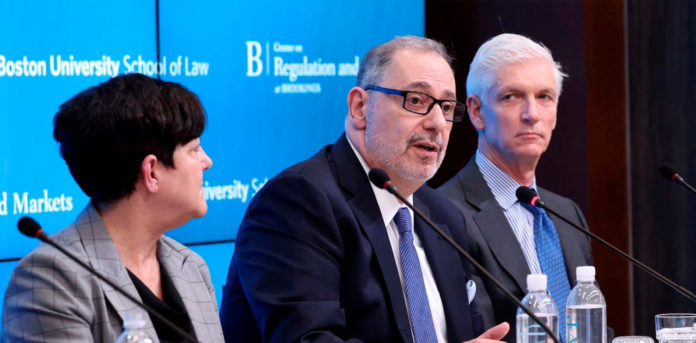Washington, D.C. – Today, at a forum on the future of the Federal Home Loan Bank System, the Rev. Luis Cortés called upon the Federal Housing Finance Agency (FHFA) to direct banks to reinvest a greater percentage of their taxpayer subsidized earnings into affordable housing. He also called on FHFA to define its regulatory mission in support of affordable housing. The forum was jointly hosted by Boston University School of Law School and Brookings Institution.
The FHLBank system was created by President Herbert Hoover. During his first and only term, America’s slide into depression was driven by a severe housing crisis spawned by a broken housing finance system. Rev. Cortés said, “Homeless families lived in shanty towns that became known as Hoovervilles. There was no funding for housing. In 1932, FHLBanks were established to create liquidity for housing. Ninety years later we have another affordable rental housing crisis. People are living in cars, in tents, and in some cases, worse. In the low-income Hispanic community of Hunting Park in North Philly that is served by Esperanza, many families move in with other families.”
Esperanza serves approximately 25,000 low-income individuals in Hunting Park each year across a range of programs and services and has a long history of implementing housing and economic development strategies. Located in one of the city’s poorest districts, the organization and its leadership has seen the affordable housing challenges confronting families and neighborhoods firsthand; challenges that are impacting families throughout the nation. It has also taken an active role in pioneering innovative solutions and calls for change.
Rev. Cortés said, “The rental housing crisis will not wait to ruin lives, disrupt families, and weaken low-income communities across the country. The sad truth is that this trillion-dollar government sponsored enterprise that receives extensive federal support (including tax-exemption and a $4 billion line of credit with the Treasury) is more focused on protecting the financial interests of its owners and users rather than meeting the crisis in affordable housing. The original statutory mission of supporting affordable housing has become an after-thought.”
This is no secret. The FHLBanks’ own combined financial report for year-end 2021 states, “The FHLBanks’ public purpose is enhancing the value of membership for member institutions” which includes “the value of the cost differential between an FHLBank’s advances and other potential sources of funds, as well as the potential for dividends.”
Rev. Cortés highlighted the importance of this moment: “FHFA Director Sandra Thompson is to be congratulated for initiating the first-ever comprehensive review of the FHLBanks’ mission and effectiveness. Left alone, the FHLBanks will continue to focus on member value. The FHFA should use its statutory authority to establish a more equitable allocation of public and private benefits flowing from this implicitly guaranteed, tax-exempt, privately owned GSE to increase liquidity for affordable rental housing.”
A sought-after leader in addressing poverty, Rev. Cortés’ key recommendations to the FHFA are (1) to define a FHLBank mission supported by existing law to underpin future FHFA regulations, and (2) to direct FHLBanks to direct the investment income generated by the restricted retained earnings toward addressing affordable housing challenges in new ways.
The required 20 percent of net income Resolution Funding Corporation (REFCORP) distribution obligation, established to address the Savings and Loans Crisis in the ‘80s and ‘90s, expired in 2011 without public debate. The FHLBanks have kept that income, which previously went to taxpayers, to build a new category of restricted retained earnings. Today, FHLBank capital is well above required levels, and restricted retained earnings are over $6 billion.
Based on 2022 3rd quarter figures, the investment income from restricted retained earnings will yield $375 million in risk-free income that will support low-cost advances and dividends. FHFA can double funding for affordable housing by redirecting these funds toward the communities who need it most. For more background on this recommendation. attached fact sheet.
A former Board member of the FHLB Pittsburgh, Rev. Cortes was joined by George Collins, Retired, Former Chief Risk Officer for FHLB Boston, Lisa Rice, President and CEO of the National Fair Housing Alliance, Julieann M. Thurlow, President & CEO of the Reading Cooperative Bank and Chair Elect of the American Bankers Association, and moderator Telis Demos of The Wall Street Journal.







